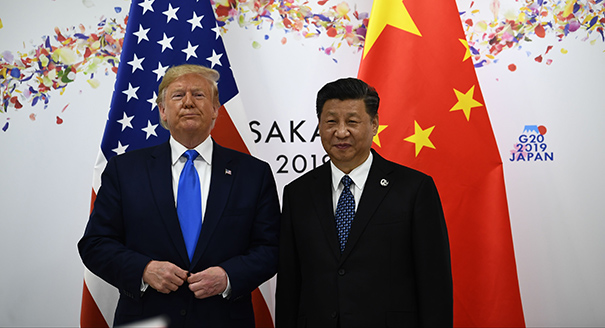Registration
You will receive an email confirming your registration.
Beijing’s advances in technology, growing global footprint, and trade and economic practices have provoked strong reactions from Washington. Though the United States and China are in the midst of negotiating a preliminary trade deal, the relationship continues to deteriorate as issues related to technology, security, and the two countries’ global roles remain unresolved. The downward pressure on bilateral relations threatens regional stability and the world economy. How can the two sides put a floor under worsening ties and establish a long-term framework that allows for competitive coexistence? Finally, how are each country’s domestic policies impacting the larger U.S.-China relationship?
In the run-up to the U.S. presidential election, Carnegie–Tsinghua Center Director Paul Haenle moderated a discussion with American and Chinese experts on how the United States is reacting to a changing China.
This panel was the second of the Carnegie Global Dialogue Series 2019-2020 and cosponsored by the China Institutes of Contemporary International Relations.
This event was off the record.
Discussion Highlights
U.S. Concerns About China: The panelists noted that some combination of the following four factors has exacerbated U.S. concerns about China’s continuing rise. First, the United States’ optimism about the inevitable continuity of the liberal international order has been challenged. Second, the American foreign policy community agrees that the post-Cold War unipolar moment has ended and that the United States is in relative decline. Third, China’s economy has rapidly developed, growing from approximately one sixteenth of U.S. GDP in 1993 to become the second-largest global economy. Fourth, the U.S. business community’s attitude toward China has shifted from embracing the opportunities presented by China’s rise to complaining about a worsening business environment with excessive rules and regulations.
Increasingly Confrontational Views: The discussants lamented that both Washington and Beijing seem to be overly focused on aggressive short-term tactics rather than opportunities for long-term cooperation. Some U.S. experts argue that Washington’s strategy of engagement with China has failed, or that it delivered Americans nothing while making China wealthier and more politically stable. China is now integral to the world economy, accounting for roughly a third of global growth. The panelists noted that, due to China’s economic centrality, decoupling would not solve many thorny issues in the bilateral relationship and would hamper collaboration on important transnational issues ranging from climate change to money laundering and from antiterrorism to drugs and organized crime.
Opportunities for Compromise: The panelists argued it is incorrect to correlate China’s rise with the United States’ relative decline. Pointing to domestic factors as partly responsible for the latter, they stated that Washington should do more to support its vulnerable citizens, that complaints about Chinese subsidies are self-defeating, and that post-World War II international structures should be adjusted to reflect China’s size, rather than be torn down. In parallel, they suggested that China should implement past trade and economic commitments and take the frustrations of foreign companies seriously. One discussant said that both sides recognize the urgency of a trade deal, which would help Trump’s reelection prospects, while securing China’s access to important U.S. technologies such as semiconductors.
The U.S.-China Relationship at a Crossroads: The panelists noted the high-level security risks of entering a new Cold War while pushing back on the notion that U.S.-China relations now resemble U.S.-Soviet ties. Instead, they characterized the present moment as a strategic crossroads following decades of balanced cooperation and competition. Both sides’ policies are crucial to determining the relationship’s trajectory. The possibility of returning to a more balanced relationship remains on the table. One panelist noted that a continuation of poor relations would provoke both countries to compete across the security, economic, and political domains, which could threaten global stability.
-
Engagement Beyond Communication: The discussants concluded that the United States and China need to take a solution-oriented approach and focus on specific behaviors and policies rather than solely condemning the other side. Both countries need to cultivate an atmosphere for collaboration and avoid narratives which constrain the space to find constructive solutions. Moreover, communication and cooperation are necessary but insufficient to solve all bilateral issues, and both sides need to show more political willingness to get the relationship back on track. Finally, American and Chinese citizens have to make a choice about whether they want a positive, constructive relationship over and beyond the next forty years.
Paul Haenle
Paul Haenle holds the Maurice R. Greenberg Director’s Chair at the Carnegie–Tsinghua Center for Global Policy based at Tsinghua University in Beijing. His research focuses on Chinese foreign policy and U.S.-China relations.
Daniel Russel
Daniel Russel is vice president for International Security and Diplomacy at the Asia Society Policy Institute. He was a career member of the Foreign Service at the U.S. Department of State, where he most recently served as the assistant secretary of state for East Asian and Pacific affairs.
Chen Wenxin
Chen Wenxin is the deputy director of the Institute of American Studies at the China Institutes of Contemporary International Relations (CICIR).
Andy Rothman
Andy Rothman is an investment strategist at Matthews International Capital Management, LLC, where he is responsible for developing research focused on China’s ongoing economic and political developments. Previously, Andy spent seventeen years in the U.S. Foreign Service, focused on China, including as head of the macroeconomics and domestic policy office of the U.S. embassy in Beijing.
Yang Wenjing
Yang Wenjing is a research professor at the China Institutes of Contemporary International Relations (CICIR) and chief of U.S. foreign policy at the Institute of American Studies, CICIR.
